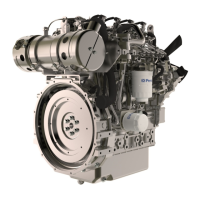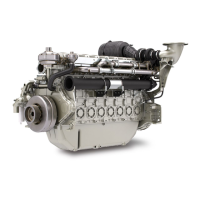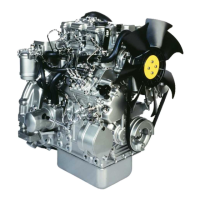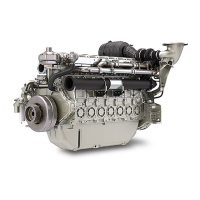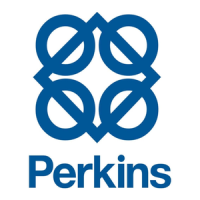
Do you have a question about the Perkins 404F-22T and is the answer not in the manual?
| Engine Model | 404F-22T |
|---|---|
| Aspiration | Turbocharged |
| Displacement | 2.2 liters |
| Cooling System | Liquid-cooled |
| Bore x Stroke | 84 mm x 100 mm |
Details on recognizing and understanding warning signs on the engine and in the manual.
Provides guidance on preventing hazards like crushing, cutting, fire, and inhalation.
Information on avoiding burns from hot engine components and fluids.
Guidance on preventing fires and explosions related to fuels and electrical systems.
Safety measures to avoid injury from moving parts and sharp objects.
Procedures and safety considerations for mounting and dismounting the engine.
Essential checks and procedures to perform before starting the engine.
Instructions and precautions for safely starting the engine.
Procedures for safely stopping the engine to prevent damage and wear.
Information on the engine's electrical system, including wiring and grounding.
Details on the engine's electronic control system and potential tampering hazards.
Overview of the engine, including model features and illustrations.
Illustrations of engine components and their locations.
Identification of engine components that are not mounted directly on the engine.
Description and illustrations of engines with a low-mounted air pump.
Detailed description of the engine's design, operation, and features.
Technical specifications for different engine models (403F-15T, 404F-22, 404F-22T).
Overview of the engine's electronic control system features.
Information on the engine's diagnostic capabilities and self-testing functions.
Factors influencing the engine's service life and maintenance importance.
Information regarding the use of non-Perkins parts and their impact on warranty.
Details on the approved aftertreatment system for emission compliance.
Identification of serial number plates and emissions certification film locations.
Details regarding the engine's emissions certification label.
Space to record engine and component information for future reference.
Procedures for lifting the engine and preparing it for storage.
Instructions and safety precautions for lifting the engine assembly.
Specifics on lifting eyes when the engine has top-mounted aftertreatment.
Guidelines for storing the engine, including period, coolant, and monthly checks.
Explanation of engine alarms, shutoffs, and their conditions.
Description of engine gauges, indicators, and warning lamps.
Overview of the engine monitoring system and its programmable options.
Details on warning indicators, their states, and operator actions.
Information on the engine's self-diagnostic capabilities and retrieving codes.
Explanation of how diagnostic codes are logged and managed by the ECM.
Guidance on operating the engine when diagnostic codes are present.
Impact of system configuration parameters on engine emissions and power.
Pre-start checks, fuel supply, and maintenance requirements.
Procedures and tips for starting the engine in cold weather conditions.
Step-by-step instructions for starting the engine correctly.
Safety precautions and procedures for jump-starting the engine.
Post-start checks, warm-up procedures, and gauge observation.
Basic principles for achieving maximum engine life and economy.
How active regeneration works and its relation to engine speed.
Process of removing soot from the DPF and regeneration types.
Information on regeneration switches, modes, and indicators.
Tips for maximizing fuel efficiency and reducing consumption.
Overview of engine performance and starting in cold weather.
Key considerations and tips for operating the engine in cold temperatures.
Importance of correct engine oil viscosity for cold weather starting.
Guidance on coolant mixture and freeze protection for cold climates.
Function and types of engine block heaters for cold weather starting.
Procedures for idling and warming up the engine in cold conditions.
How fuel properties and types affect engine operation in cold weather.
Measures to prevent freezing and plugging of the crankcase ventilation system.
Information on fuel tanks, filters, and heaters for cold weather operation.
Recommended procedures for safely stopping the engine after operation.
Guidelines for using emergency stop controls and their purpose.
Checks and procedures to perform after the engine has been shut down.
Specifies the oil and coolant capacities for different engine models.
Details on engine oil sump and total lubrication system capacities.
Refill capacities for engine oil for 403F-15T and 404F-22/22T engines.
Refill capacities for cooling systems for 403F-15T and 404F-22 engines.
Information on coolant types, properties, and maintenance requirements.
Details on using glycol in the coolant for freeze and boil protection.
Recommended coolants (ELC, SCA) and their specifications.
Information on Extended Life Coolant (ELC) use and maintenance.
Procedures for handling ELC contamination and maintaining system integrity.
Guidance on using heavy-duty antifreeze and Supplemental Coolant Additive (SCA).
Procedures for cleaning and maintaining heavy-duty antifreeze cooling systems.
Information on lubricant standards (API, SAE, ACEA) and licensing.
Definitions of abbreviations and terms related to engine oils.
Specifications and viscosity recommendations for engine oil.
Chart showing recommended oil viscosity grades based on ambient temperature.
Perkins' recommendation regarding the use of aftermarket oil additives.
List of terms and acronyms used in fluid recommendations.
Information on acceptable diesel fuel specifications for Perkins engines.
Details on fuel characteristics like cetane number and sulfur content.
Explanation of fuel viscosity, density, sulfur, and other properties.
Information and recommendations for using biodiesel fuels.
Specific fuel requirements and considerations for cold weather operation.
Information on aftermarket fuel additives and Perkins diesel fuel system cleaner.
Procedures for safely releasing pressure in the coolant, fuel, and oil systems.
Correct procedures to follow when welding on engines with electronic controls.
Identifying and managing engines operating under severe conditions.
Impact of ambient temperatures and air quality on engine performance.
Factors contributing to severe service, including buildup and operating procedures.
Scheduled maintenance tasks based on service hours or calendar intervals.
Recommended inspection procedures for the engine alternator.
Instructions for inspecting and adjusting alternator and fan belts.
Procedure for replacing alternator and fan belts.
Steps and safety precautions for replacing the engine battery.
Procedures for disconnecting battery cables safely.
Inspection, adjustment, and replacement of the air pump belt.
Specific interval for replacing the air pump belt.
Procedures for changing commercial heavy-duty coolant and flushing.
Steps for draining, flushing, and filling the cooling system with ELC.
Methods for checking coolant levels in systems with or without recovery tanks.
Procedure for replacing the water temperature regulator.
Testing and adding SCA to the cooling system for protection.
Procedure for replacing the crankcase breather canister.
Instructions for cleaning the Diesel Particulate Filter (DPF).
Procedures and benefits of keeping the engine clean.
Instructions for replacing the engine air cleaner element.
How to inspect and test the engine air cleaner service indicator.
Procedure for checking and cleaning the engine air precleaner.
Inspection of engine mounts for deterioration and proper torque.
Procedure for checking and maintaining the engine oil level.
Steps for draining oil, filling crankcase, and changing oil filter.
Procedure for removing and installing the engine oil filter.
Importance and procedure for checking engine valve lash.
Procedure for checking clearance between the fan and cover.
Instructions for replacing the in-line fuel filter.
Information on testing and changing fuel injectors.
Procedure for priming the engine fuel system.
Instructions for replacing the fuel system secondary filter.
Procedure for draining water and sediment from the fuel tank.
Procedure for replacing glow plugs used in ARD combustion.
Inspection and replacement of engine hoses and clamps.
Instructions for cleaning the engine radiator.
Procedure for cleaning and replacing the radiator pressure cap.
Recommended inspection procedures for the engine starting motor.
Visual inspection guidelines for the turbocharger.
Daily inspection routine to check for leaks and loose connections.
Detailed checks for leaks in various engine systems and connections.
Procedure for inspecting the engine water pump for leaks.
General overview of warranty coverage and terms.
Warranty details for emission-related parts and components.
Emission control system warranty specific to California regulations.
Information on emission control system function and maintenance requirements.
Information on extended service contracts for engine protection.
Details on Extended Service Contracts (ESC) for unexpected repair costs.


